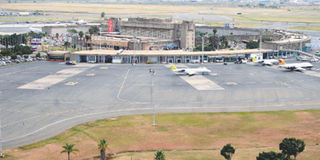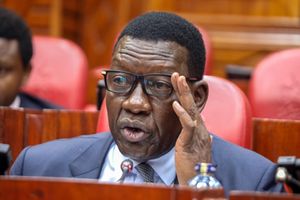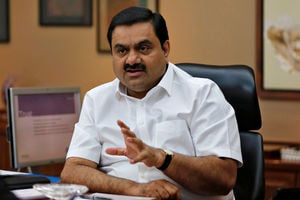
An aerial view of Jomo Kenyatta International Airport. The World Duty Free Company does not hold exclusive rights to operate shops in Kenyan airports, a court was told on May 16, 2012.
One day in February 1989, a curious event unfolded. Nasir Ibrahim Ali, a businessman, approached Rashid Sajjad, a prominent Kanu figure in Mombasa, with a proposition. Ali sought to establish duty-free shops across Kenya and required licences.
Sajjad assured Ali that he could arrange meetings with President Daniel Moi and relevant officials. However, there was a catch – Ali was to prepare a “personal donation” of $2 million (more than Sh260 million) in cash to present to the president.
It was widely known that Moi had an affinity for money, and the Kanu powerbrokers were aware of how to exploit this vulnerability. Ali grasped the situation.
This was not merely a donation but a bribe – a price for securing control of the duty-free spaces at Jomo Kenyatta International and Moi International airports for his company, House of Perfume.
Ali transferred $2 million into Sajjad’s London account, trusting it would reach Moi. On the day of the meeting with the president, unease gripped Ali. The weight of delivering a bribe to a head of state was overwhelming.
As if instructed, Ali discreetly left $500,000 in a briefcase by a wall in Moi’s Kabarak house. When the meeting concluded, and with the business seemingly settled, Ali was handed back the briefcase. He later discovered that “the money had been replaced with fresh corn.”
Whatever the gesture meant, Ali departed with the sense that the deal was sealed. Shortly after, Kenyans were informed of a government partnership with House of Perfume, which was granted 3,000 square metres at JKIA and 2,000 square metres at Moi International Airport.
Justifications were presented, cloaked in the rhetoric of job creation.
In the wake of the Kabarak meeting, an agreement was formalised on August 25, 1990, signed by Hezekiah Oyugi, the PS in the Office of the President, Charles Mbindyo, the Treasury PS, and House of Perfume.
The deal, amended on May 11, 1990, granted World Duty Free Company Ltd – House of Perfume’s successor – the exclusive rights to operate duty-free shops and advertisements at national airports.
House of Perfume, a division of Al Ghurair conglomerate from Dubai, stood poised to benefit immensely. The government spun a grand narrative, claiming this was “to enhance the international image of the Kenya and promote tourism”.
The company was supposedly brought in to “construct, maintain and operate to the highest global standards” the duty-free complexes in Nairobi and Mombasa. It was a 10-year lease, with an option to extend for another decade.
Beneath the grandiose claims lay a scandalous arrangement: the government demanded a paltry $1 million per year, translating to just $2,700 a day for leasing prime spaces at Kenya’s major airports.
The agreement handed over “sole and exclusive rights within the areas designated as airports,” including terminals that might be built. House of Perfume was even granted the privilege to sub-let the spaces to any person, including non-citizens.
For the same modest fee, the firm obtained the option to build and operate transit hotels, with a minimum of eight beds, complete with restaurant and bar facilities for transit passengers.
The government pledged not to grant similar rights to any other entity “without written consent of the company”.
A further clause ensured that “passenger traffic at each airport... would be routed through the leased premises”.
Ali had freedom to select the most lucrative spaces for his business. Even the building materials and products needed for the operation of the complexes were to be imported without the payment of taxes or duty – a concession extended to sub-lessees. The firm was granted the right to employ foreigners, with the government guaranteeing that visas and permits would be processed “without restrictions”.
With the agreement in place, previous leases would not be renewed. House of Perfume would hold the exclusive rights to the airport duty-free spaces.
Those hoping to renew leases would have to become House of Perfume tenants. Perhaps most egregiously, the government promised that no authority would interfere with the company’s operations, and profits would be transferred abroad without restrictions.
Finally, the company was granted control of Kenya Airways’ inflight magazine and exclusive rights to airport advertising.
With the contract signed, Kenya’s airports were now under the dominion of Nasir Ali’s company, christened World Duty Free. The arrangement was a staggering coup for Ali.
For a mere $1 million a year, World Duty Free would enjoy exclusive rights over all duty-free shops and advertising spaces at JKIA and Moi International. The terms were strikingly generous: the company could sublet to non-citizens, import goods duty-free and transfer profits abroad without interference. The gates of Kenya had been handed over on a silver platter.
The scandal, however, lay not merely in the brazen terms of the deal but in the unbridled lengths to which the government bent to accommodate one entity’s whims. World Duty Free encroached upon airport security zones, evicted airlines from first-class lounges to expand its empire, and yet the government, caught in a web of its own making, could not resist. In 1991, Al-Ghurair family sold its stake in the venture, leaving Ali with majority control.
Enter Kamlesh Pattni, a man whose name was already steeped in infamy due to the Goldenberg scandal, Kenya’s largest financial fraud. Through dubious legal manoeuvres and what Ali called “fabrication of evidence and perversion of justice,” Pattni laid claim to World Duty Free. Tensions between Ali and the political elite mounted.
Pattni, along with State House barons, sought to use World Duty Free as a conduit for siphoning secret funds abroad to finance Moi’s re-election campaign. Ali, steadfast in his refusal to embroil his company in the Goldenberg fraud, found himself isolated.
The courts, under shadowy influences, declared Pattni the rightful owner of World Duty Free, and by 1998, the company was placed under receivership, a move designed to destroy critical evidence. Shortly thereafter, Ali was deported.
In 2001, Pattni registered a new entity in the British Virgin Islands under the same name – World Duty Free – and continued his dominion over Kenya’s airports.
A legal battle ensued, with Ali taking his case to the International Convention for the Settlement of Investment Disputes. There, he confessed to the bribery that had secured his original contract with Moi.
Back in Nairobi, Pattni, under the guise of a new company, Diplomatic Duty Free, entrenched himself further, controlling over 90 per cent of the duty-free spaces in Kenya’s airports.
His stranglehold on these sections was so complete that he filed over 20 cases against the Kenya Airports Authority (KAA) whenever his leases were due to expire, thwarting any attempts at competition. In 2008, Pattni won a major case against KAA “for loss of business” and the arbitrator Justice Torgbor awarded World Duty Free $49 million.
That is approximately Sh6.3 billion today. By 2013, World Duty Free occupied 80 per cent of the available duty-free space.
Then came the climax.
On August 1, 2013, KAA finally evicted Pattni’s World Duty Free. But one week later, JKIA was engulfed in flames. In the wake of the fire, Pattni and the government withdrew all legal cases, a move that left much of the public stunned.
Meanwhile, the Geneva court found the original 1989 agreement null and void, citing corruption. Thus, the tale of Kenya’s duty-free empire came full circle – cautionary tale of ambition, corruption and the lengths to which power will go to protect its own interests.
As Kenya now navigates new deals and new players, the spectre of Pattni and the duty-free saga looms large, a reminder that, in the corridors of influence, history has a way of repeating itself. Only that the players are different.
[email protected] @johnkamau1










